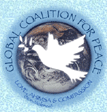 |
 |
 |
A NEW ECONOMIC PARADIGM FOR A CULTURE OF PEACE
 |
 |
 |
 |
 |
 |
|
Failure to meet the needs of the world's poorest citizens threatens long-term
global stability, reports Vital Signs 2003, the latest publication from
the Worldwatch Institute, a Washington, D.C.-based research organization.
The report points to the more than 13 million children who have lost a
parent due to AIDS, the 14.4 million people who die each year from infectious
disease, and the 12 million international refugees in the beginning of
2002 as clear indicators of a world where human suffering is rampant.
While the global economy has grown sevenfold since 1950, the disparity
in per capita income between the 20 richest and 20 poorest nations more
than doubled between 1960 and 1995. "The world's failure to reduce
poverty levels is now contributing to global instability in the form of
terrorism, war, and contagious disease," says Vital Signs Project
Director Michael Renner. "An unstable world not only perpetuates
poverty, but will ultimately threaten the prosperity that the rich minority
has come to enjoy." Vital Signs 2003- produced in cooperation with
the United Nations Environment Programme (UNEP)- also warns that environmental
degradation is exacerbating poverty and further contributing to global
instability. Weather-related disasters brought on by land clearing, deforestation,
and climate change are most catastrophic for the world's poorest citizens.
In 2002, rains in Kenya displaced more than 150,000 people, while more
than 800,000 Chinese were affected by the most severe drought in over
a century. Over the past two decades, floods and other weather-related
disasters were among factors prompting some 10 million people to migrate
from Bangladesh to India. At least seven small island nations face the
prospect of a sizable share of their populations being displaced by sea
level rise due to global warming in the coming decades. "It is almost
impossible to ensure lasting peace and stability when massive inequalities
exist and the natural systems that support us remain under threat,"
says UNEP Executive Director Klaus Toepfer. "Little will ever be
achieved in terms of conservation of the environment and natural resources
if billions of people have no hope, no chance to care. "For the past
12 years, Vital Signs has tracked a wide array of economic, environmental,
and social trends, using thousands of different data sources, in order
to gauge the health of human societies and the natural world. Among the
indicators of growing pressures on the world's poor cited in this years
report: Infectious diseases kill twice as many people worldwide as cancer
each year. Those dying of infectious illnesses are often either in the
early or prime years of life, unravelling the economic and social fabric
of societies. (The dramatic emergence of SARS in recent months now threatens
the health not only of Asian economies but also of the global airline
industry). Roughly one-quarter of the world's 50 wars and armed conflicts
of recent years have involved a struggle for control of natural resources.
Virtually all of these conflicts have occurred in poor countries where
a particular ethnic group or economic elite has gained control of resources
at the expense of the poor majority. Harvesting of illegal drug crops-principally
cannabis, coca, and opium poppies- has increased dramatically since the
1980s, leading to rising addiction rates in industrial nations, and a
growing black market that undermines development in many poor nations.
In addition to the 12 million "official" refugees worldwide,
there are another 50 million environmental refugees-driven from their
homes by dam building, drought, flooding, etc.- and other internally displaced
persons not included in official UN statistics. Corruption - the misuse
of public power for private benefit - is costing some of the world's poorest
countries billions of dollars each year and undermining efforts to promote
economic development. Vital Signs 2003 provides further evidence of the
importance of the Millennium Development Goals, adopted by 191 nations
in 2000. Among other targets, these goals call for halving the share of
the world's people living in extreme poverty by 2015, as well as the share
suffering from hunger and lacking access to clean drinking water; reducing
infant mortality rates by two-thirds; and ensuring that all children are
enrolled in primary school. Governments reaffirmed the Millennium Development
Goals at last year's World Summit on Sustainable Development in Johannesburg
and agreed to several other important targets, including restoring fisheries,
stabilizing biological diversity, and meeting the sanitation needs of
half a billion people. In this year's edition, the following trends stand
out as holding promise for progress: HIV/AIDS TREATMENT: While only four
percent of people living with HIV/AIDS in low- and middle-income countries
are receiving treatment, some progress has been made in making access
to treatment more equitable. In 2002, Botswana became the first African
nation to adopt a policy of universal access to treatment, while other
nations like Brazil, Argentina, Costa Rica, and Panama are providing free
or subsidized treatment. COMMUNICATIONS: The gap between the information
haves and have-nots is still huge but shrinking, thanks largely to new
mobile phones, whose towers are cheaper to build than conventional, fixed-line
systems. In Africa, mobile phones now outnumber fixed lines by a higher
ratio than on any other continent. CLEAN ENERGY: New industries are beginning
to provide pollution-free electricity and good jobs. Global wind power
use has tripled since 1998 and is the now the world's fastest-growing
power source. As new policies are adopted, rapid growth is projected in
China and India over the next few years. In light of the many findings
in Vital Signs 2003, Worldwatch President Christopher Flavin expressed
deep concern that a faltering global economy and the vast effort now required
to restore peace in the Middle East will divert the resources needed to
address the causes and consequences of poverty in scores of developing
nations. "The human tragedies behind the statistics in Vital Signs
2003 are compelling reminders that social and environmental progress are
not luxuries that can be set aside when the world is experiencing economic
and political problems," says Flavin. "Suffering that is allowed
to fester today will lead to adverse and unpredictable consequences for
many tomorrows to come."
World Watch Magazine
May/June 2003
FACTORY FARMING GOES GLOBAL
Washington, D.C. - Large-scale expansion of factory farming into developing countries such as Mexico, India. China, and the Philippines is bringing unanticipated dangers to environmental and human health, according to the May/June 2003 edition of the Worldwatch Institute's magazine, World Watch. While increasing the production of meat, the mass- producing facilities threaten the survival of indigenous livestock and are contributing to groundwater pollution, the spread of food-borne illnesses, and antibiotic resistance, writes researcher Danielle Nierenberg in "Factory Farming in the Developing World."
"Factory farming methods are creating a web of food safety, animal welfare, and environmental problems around the world, as large agribusinesses attempt to escape tighter environmental restrictions in the European Union and the U.S. by moving their animal production operations to less developed countries," says Nierenberg.
Nierenberg's investigation focuses particularly on the Philippines, one
of the emerging centers of large-scale livestock production and processing
in the developing world. In that country alone, annual production of poultry
has increased five-fold since 1980. This industrialization of livestock
production nearly wiped out the stock of native Filipino chickens and
forced most family farmers out of business or into adopting factory farming
methods themselves.
International regulations on factory farming and an improved process of
zoning farms in economically viable places with the least environmental
impact are only part of the solution, asserts Nierenberg. She also argues
that the lessons of factory farming should prevent its continued expansion
and should translate into the preservation of prosperous family farms
where raising healthy, humanely treated animals is viewed as a form of
affluence.
LOCAL COMMUNITIES RISE UP AGAINST "FOOD IMPERIALISM" AROUND THE WORLD
Local communities are increasingly resisting the multinational food conglomerates that control and shape global food production and distribution, writes Brian Halweil in the May/June 2003 edition of World Watch. From the owner of a diner in Vermont to the Nine Seeds Movement in India, local activists are taking matters in their own hands in attempts to guide food systems back to their local roots.
"We are beginning to see declarations of independence from the existing system in which the Krafts, Monsantos, and Archer Daniels Midlands play the roles of the Tudors, Tzars, and Louis XIVs in our modern food systems," says Halweil in "The Argument for Local Food." The article documents how these activists, propelled by more than concern over food safety risks, are working toward a more democratic system of producing food.
Money spent locally on food generates nearly twice as much income for the local economy, according to Halweil. In addition, local food systems promote greater crop diversity and reduce costly dependence on fossil fuels. Greater food self-sufficiency could also prove particularly important for developing countries that want to achieve a certain measure of independence from the fluctuations of international markets and the constraints of international trade agreements.
WAR IN IRAQ: FREE FLOW OF OIL OR FREE WORLD?
Oil has been at the root of wars from Angola to Indonesia. Nevertheless, supporters of the Bush administration's war in Iraq insist that oil is not a major reason for the invasion. World Watch editor Ed Ayres cites numerous other wars in which oil has played a role, and questions whether the spoils of this war may not figure more prominently than the administration's "free world" argument after all.